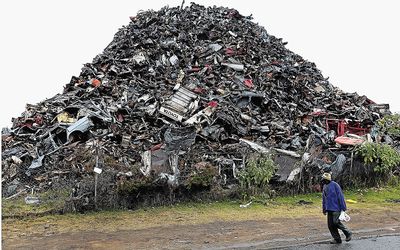Policy over scrap metal requires industry input
by Virusha Subban and Yonatan Sher,
2016-03-15 05:47:06.0
THE road to the preferential pricing system policy for scrap metals was paved with the best intentions. In August 2013, amid vociferous protest and unsuccessful legal challenges from the metal recycling industry, the Economic Development Department pushed through a new directive that gave the International Trade Administration Commission (Itac) the power to bar exports of ferrous and nonferrous scrap metal unless it is offered first to domestic purchasers at a 20% discount to the prevailing international price.
The discount has subsequently been increased to up to 30% on some types of scrap metal in a 2014 amendment to the guidelines. Itac will approve an export permit only if domestic users have not taken up the offer to purchase the scrap after 15 working days.
The policy is an attempt to stem the tide of SA’s continuing deindustrialisation, against a backdrop of many domestic foundries and other beneficiators closing shop or decreasing production capacity significantly.
One of the main issues identified was that high volumes of scrap metal exports were depriving the domestic beneficiators of affordable and quality inputs in the manufacturing process.
Scrap metal accounts for a large percentage of the beneficiators’ input costs, and the struggling and distressed beneficiation sector welcomed the 20%-30% reduction, but recognised the system was an imperfect long-term solution.
However, more than two years later, the system has experienced noticeable teething problems.
There has been an insignificant effect on the tonnage exported before and after its introduction.
According to Economic Development Minister Ebrahim Patel, replying to a question in the National Assembly, Itac approved from September last year more than 94% of applications to export scrap metal.
The beneficiation industry complains the restrictions have had little or no effect in reducing the price of input costs for beneficiators, and some have even complained of prices increasing.
Scrap dealers complain of tonnes of waste metals piling up in scrapyards due to the time delays involved in first offering domestic industry, then applying for a permit and waiting for it to be granted.
The scrap dealers argue that, although most applications may be approved, all delays in the movement of the metal increase their exposure to commodity market risks and precipitate cash-flow issues.
The beneficiators have accused scrap merchants of circumventing the system with a range of tactics that force beneficiators to forego the mandatory discounted offer.
The scrap merchants have in turn blamed beneficiators for making frivolous offers to purchase scrap just so that Itac will deny or delay the permits and thus frustrate their exports. They complain some local buyers object to the permit, but do not provide payment terms and do not collect the goods, or fail to pay on time.
What everyone agrees on is that the system is not working.
To tackle these concerns, amendments to the system policy were proposed in December. The deadline for comments on the proposed amendments was February 5. Itac is now collating and processing the input it received from stakeholders.
It is already apparent from the proposed amendments that the government’s response to the failure of the system has not been to attend to the economically unsound root of the issue and approach its goals from a new angle, but to tackle the symptoms of a flawed system and ramp up enforcement, increase controls, and to crack down on illegal exporters.
Examples of such measures are the proposed new requirements for more detailed documentation to be submitted to Itac before export permits are granted, a ban on cash payments for scrap to make the money trail easier to trace, and the requirement that all scrap metal be exported only through the Port Elizabeth harbour.
What the government has missed is that the tension between the scrap metals industry and the beneficiation industry has its source in a solution foisted on them by the government, instead of a comprehensive negotiated partnership between the sectors.
Such a negotiated, industry-driven solution was imminent before the government first introduced the policy guideline in 2013. Industry players such as the Metal Recyclers Association of SA, the South African Institute of Foundrymen, and Business Unity SA, were engaged in discussions about a way forward.
A report was also commissioned from expert analytical firm Conningarth Economists to advise on solutions that would have the least detrimental effect on all sectors of the economy.
The discussions and report did not influence the government’s original proposals.
There is another opportunity for the government to craft industry-driven solutions instead of pursuing failed policies more zealously in an empty bid to salvage them.
If the government fails yet again to avail itself of this opportunity to heed the voice and get the buy-in of the scrap metals industry and the beneficiation industry, the proposed amendments could be open to legal challenges on the ground that they restrict freedom of trade unnecessarily.
• Subban is partner specialising in customs, excise and international trade, and Sher a candidate attorney at Bowman Gilfillan Africa Group

Scrap dealers complain the preferential pricing system causes tonnes of waste metals to pile up in scrapyards due to delays in first offering it to local industry, then applying for a permit and waiting for it to be granted. Picture: THE TIMES
THE road to the preferential pricing system policy for scrap metals was paved with the best intentions. In August 2013, amid vociferous protest and unsuccessful legal challenges from the metal recycling industry, the Economic Development Department pushed through a new directive that gave the International Trade Administration Commission (Itac) the power to bar exports of ferrous and nonferrous scrap metal unless it is offered first to domestic purchasers at a 20% discount to the prevailing international price.
The discount has subsequently been increased to up to 30% on some types of scrap metal in a 2014 amendment to the guidelines. Itac will approve an export permit only if domestic users have not taken up the offer to purchase the scrap after 15 working days.
The policy is an attempt to stem the tide of SA’s continuing deindustrialisation, against a backdrop of many domestic foundries and other beneficiators closing shop or decreasing production capacity significantly.
One of the main issues identified was that high volumes of scrap metal exports were depriving the domestic beneficiators of affordable and quality inputs in the manufacturing process.
Scrap metal accounts for a large percentage of the beneficiators’ input costs, and the struggling and distressed beneficiation sector welcomed the 20%-30% reduction, but recognised the system was an imperfect long-term solution.
However, more than two years later, the system has experienced noticeable teething problems.
There has been an insignificant effect on the tonnage exported before and after its introduction.
According to Economic Development Minister Ebrahim Patel, replying to a question in the National Assembly, Itac approved from September last year more than 94% of applications to export scrap metal.
The beneficiation industry complains the restrictions have had little or no effect in reducing the price of input costs for beneficiators, and some have even complained of prices increasing.
Scrap dealers complain of tonnes of waste metals piling up in scrapyards due to the time delays involved in first offering domestic industry, then applying for a permit and waiting for it to be granted.
The scrap dealers argue that, although most applications may be approved, all delays in the movement of the metal increase their exposure to commodity market risks and precipitate cash-flow issues.
The beneficiators have accused scrap merchants of circumventing the system with a range of tactics that force beneficiators to forego the mandatory discounted offer.
The scrap merchants have in turn blamed beneficiators for making frivolous offers to purchase scrap just so that Itac will deny or delay the permits and thus frustrate their exports. They complain some local buyers object to the permit, but do not provide payment terms and do not collect the goods, or fail to pay on time.
What everyone agrees on is that the system is not working.
To tackle these concerns, amendments to the system policy were proposed in December. The deadline for comments on the proposed amendments was February 5. Itac is now collating and processing the input it received from stakeholders.
It is already apparent from the proposed amendments that the government’s response to the failure of the system has not been to attend to the economically unsound root of the issue and approach its goals from a new angle, but to tackle the symptoms of a flawed system and ramp up enforcement, increase controls, and to crack down on illegal exporters.
Examples of such measures are the proposed new requirements for more detailed documentation to be submitted to Itac before export permits are granted, a ban on cash payments for scrap to make the money trail easier to trace, and the requirement that all scrap metal be exported only through the Port Elizabeth harbour.
What the government has missed is that the tension between the scrap metals industry and the beneficiation industry has its source in a solution foisted on them by the government, instead of a comprehensive negotiated partnership between the sectors.
Such a negotiated, industry-driven solution was imminent before the government first introduced the policy guideline in 2013. Industry players such as the Metal Recyclers Association of SA, the South African Institute of Foundrymen, and Business Unity SA, were engaged in discussions about a way forward.
A report was also commissioned from expert analytical firm Conningarth Economists to advise on solutions that would have the least detrimental effect on all sectors of the economy.
The discussions and report did not influence the government’s original proposals.
There is another opportunity for the government to craft industry-driven solutions instead of pursuing failed policies more zealously in an empty bid to salvage them.
If the government fails yet again to avail itself of this opportunity to heed the voice and get the buy-in of the scrap metals industry and the beneficiation industry, the proposed amendments could be open to legal challenges on the ground that they restrict freedom of trade unnecessarily.
• Subban is partner specialising in customs, excise and international trade, and Sher a candidate attorney at Bowman Gilfillan Africa Group
























Change: 1.19%
Change: 1.36%
Change: 2.19%
Change: 1.49%
Change: -0.77%
Data supplied by Profile Data
Change: -0.19%
Change: 0.69%
Change: 1.19%
Change: 0.00%
Change: 0.44%
Data supplied by Profile Data
Change: 0.62%
Change: 0.61%
Change: 0.23%
Change: 0.52%
Change: 0.12%
Data supplied by Profile Data
Change: -0.21%
Change: -1.22%
Change: -0.69%
Change: -0.51%
Change: 0.07%
Data supplied by Profile Data